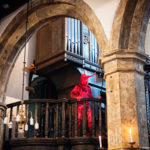The Harrowing of Hell has a claim to be the earliest dramatic work from Britain, having been originally composed at Lindisfarne. This Anglo-Saxon play retells the legend of how Christ descended to Hell after his death on the Cross.
Find out more
Learn how we pieced together fragments of this ancient play and reimagined the possible music to accompany it
According to orthodox Christian belief, the fall of Adam and Eve from Paradise placed all humanity in the power of the devil until Christ redeemed those who accepted the faith by his death on the Cross. But what about those who had lived and died before Christ’s incarnation? This led to the legend, first found in the apocryphal Gospel of Nicodemus, that between his death on the Cross and his resurrection, Christ went to Hell, overthrew the devil, released the ancient righteous along with Adam and Eve, and led them to heaven.
This is the subject of the fragmentary Latin Harrowing of Hell, found in the ninth-century Book of Cerne but possibly derived from eighth-century Lindisfarne, which has a good claim to the title of the earliest dramatic work from the British Isles. It breaks off early in Eve’s appeal to Christ, but an Old English version of it, recast into sermon form, survives in the tenth-century Blickling Homilies, where it is preceded by a scene in which the lesser devils blame Satan for bringing Christ to Hell and allowing him to defeat them. Our version, performed in modern English, includes both scenes and links them with a ninth-century ceremony for the dedication of a church in which the bishop sings Christ’s words in the Gospel of Nicodemus derived from Psalm 24: Atollite portas principes vestras, et elevamini, portae eternales, et introibit rex gloriae ‘Lift up your gates, you princes, and be lifted up, you eternal doors, and the King of Glory will come in’, to which a priest inside the church responded with Satan’s Quis est iste rex gloriae ‘Who is that King of Glory?’ and received the reply Dominus virtutum, ipse est rex gloriae ‘ The Lord of Hosts, he is the King of Glory’. ‘Satan’ then fled from the church back to Hell.












